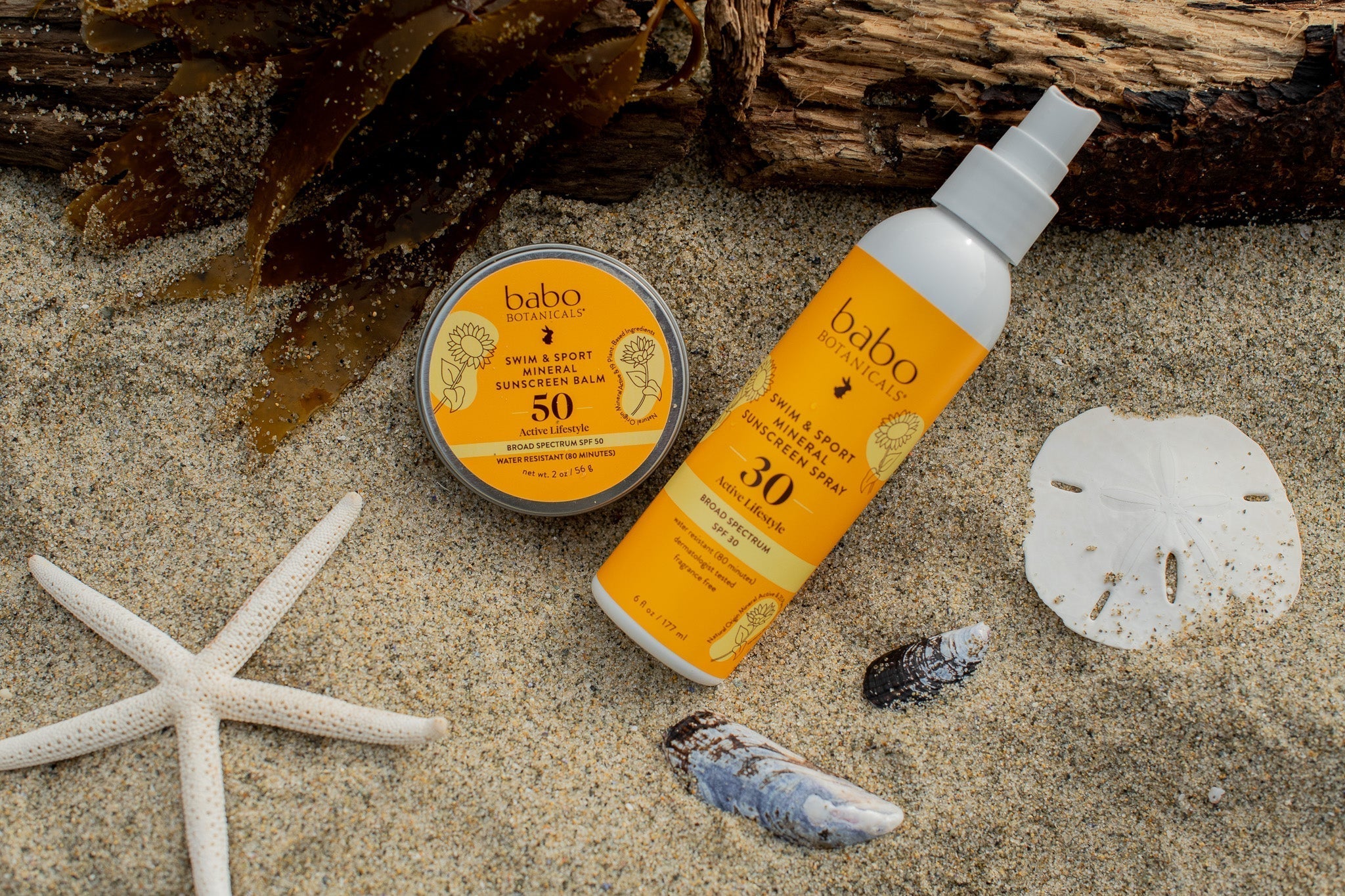
Does Sunscreen Expire? How to Tell, Risks & More
Like all skin care products, sunscreen can expire as well. Using expired sunscreen won’t effectively protect your skin from the sun, so it’s imperative to check the expiration date on your sunscreen bottle before lathering yourself up in SPF.
According to FDA guidelines, all sunscreens should have an expiration date unless stability testing conducted by the manufacturer has shown that the product will remain stable for at least three years. Once a sunscreen has expired, it should be thrown away as it no longer will provide adequate sun protection.
In this article, we’ll answer important questions like “when does sunblock expire?” and “what’s the risk of using expired sunscreen?”, so that you can keep your family safe and comfortable this summer during every adventure! Let’s get straight to the big question.
- When Does Sunscreen Expire?
- How To Tell If Your Sunscreen Has Expired
- What’s The Risk of Using Expired Sunscreen?
- How To Make The Most Of Your Sunscreen
- Sunscreen Expiration FAQs
- Sunscreen Expiration Recap
When Does Sunscreen Expire?
So now that you know that sunscreen can expire, you’re probably thinking, “how long is sunscreen good for?”
The FDA (the U.S. Food and Drug Administration) requires that all sunscreens list an expiration date on the bottle unless that sunscreen has a shelf life of at least three years.
However, most sunscreen companies do include an expiration date on their products in order to ensure consumers can be guaranteed the formula is still good to use. Sunscreens are usually good to use for 2 to 3 years after their manufacturing date. Referring to the individual expiration date printed on your sunscreen will help you confirm it is still within this timeframe.
Other than time, what makes a sunscreen expire? Exposure to heat and sun. So, if your sunscreen is in and out of the sun (what sunscreen isn’t?) or stored in the garage, it may go bad sooner than the expiration date. Consult the Drug fact box for potential reactions to exposure to heat.
There are a few simple ways to tell if your sunscreen has expired.

How To Tell If Your Sunscreen Has Expired
Both chemical and mineral sunblocks expire. (If you aren’t familiar with the differences between mineral vs. chemical sunscreen, check out our explanation here).
As time goes by, chemical sunscreens with active ingredients like avobenzone or octocrylene go through a process called oxidation (a chemical reaction that changes a substance). Mineral sunscreens with active ingredients of either zinc oxide or titanium dioxide also degrade over time.
Sunscreens must be stored at room temperature and not exposed to extreme temperatures. Follow the directions and information in the Drug fact box on the product for detailed information. Other than checking the expiration date, how can you do a quick check to tell if your sunscreen is still good or not? There are a few key indications that will tell you if your sunscreen has expired, such as:
- Change in texture: When mineral sunscreens have been around too long, they tend to separate (you’ll notice a runny liquid) or become grainy. Chemical sunscreens can change in texture as well.
- Change in color: Expired chemical sunscreens may have an unintended yellow tint.
- Change in smell: Expired chemical sunscreens often have an unusual scent.
Now that you know how to understand sunscreen expiration dates and even decide for yourself if it’s time to replace your old sunscreen, you’re probably wondering what the big deal is.
Is it really that bad to use an expired sunscreen when you’re in a pinch?
What’s The Risk Of Using Expired Sunscreen?
If your only options are using an expired sunscreen or no sunscreen at all, using the expired sunscreen is the better choice.
Always try to keep your sunscreen up to date because there are a few reasons why using expired sunscreen is a bad idea.
1) Expired Sunscreen May Not Be Effective
Checking on sunscreen expiration is pretty important because an expired sunscreen will leave you susceptible to sun-related risks. An expired sunscreen becomes less effective at warding off UVA and UVB rays.
This means you’re at risk for sunburn, premature aging, skin damage, and skin cancer — all the issues that come along with too much sun exposure.
Plus, even if the active ingredients in your expired sunscreen are still effective, it may simply be that it won’t spread evenly on your skin to provide you with appropriate protection. Either way, expired sunscreen is not worth the risk.
If you accidentally spent a day in the sun using an expired sunscreen and are now sunburnt, care for your skin after the fact with our After Sun Aloe & Cucumber Soothing Mist

Apply this soothing, cooling, and quick-absorbing aloe vera gel to your face or body — wherever your sun-kissed skin needs some relief!
In addition to aloe leaf juice, our gel contains green tea, witch hazel, arnica, and eucalyptus oil. All that goodness for your skin and absolutely no gluten, dairy, soy, parabens, and phthalates.
2) Expired Sunscreen Can Contain Microorganisms
Like any cosmetic product, once passed the expiration date, the ingredients that help preserve the formula might decrease in effectiveness. The longer sunscreen sits around and the more you open it, shut it, and take it on all your adventures, the more chance there is for bacteria to grow. Bacteria isn’t good for anyone’s skin and can cause irritation or a breakout.
But if you have especially sensitive skin, you already know that you need to be extra careful with what you put on it. You’ll want to think twice before slathering on a questionable sunscreen.
Speaking of you sensitive skin folks and sun protection, you may find that even current chemical sunscreens irritate your delicate skin.
But a fragrance-free mineral sunscreen is especially important if you have easily irritated skin. Opt for a zinc oxide sunscreen, like our Sheer Zinc Mineral Sunscreen Lotion SPF30. Our unique, sheer formula is made with skin-soothing certified organic oils.
Plus, there’s something for every member of your family! We’ve even got your littlest ones covered with SPF 50 Baby Skin Mineral Sunscreen.
Now that you have the scoop about sunscreens expiring, what steps can you take to prolong their shelf life?
How To Make The Most Of Your Sunscreen
When it comes to getting the most out of your sunscreen and making it last as long as possible, there are just a few things to keep in mind.
1) Keep Sunscreen At Room Temperature
As we mentioned earlier, sunscreen goes bad more quickly if it’s exposed to heat. Obviously, your sunscreen should come with you to the pool or the beach — anytime you’re out in the sun. So, some heat exposure is inevitable!
But while you’re out and about, rather than leaving your sunscreen in the sun, keep it inside your beach bag, backpack, or purse. If you can leave it in the shade, even better!
To protect it from the heat in-between outings, store your sunscreen inside the house instead of leaving it in the car or on a shelf in the garage.
2) Apply enough Sunscreen every time you use it
If a bottle lasts you three years, that either means it has been lost in the bottom of your bag or that you’re not using enough sunscreen every time you apply.
A little dab of sunscreen here and there is not enough. Apply it generously all over your body to get the best protection!
If you’re applying mineral sunscreen sparingly because of how it tends to leave you one shade whiter all over, fear no more. At Babo Botanicals, we’ve got you covered.
Our mineral sunscreen, like our Sheer Zinc Mineral Sunscreen Spray SPF30, goes on Sheer. No more white streaks!

Sunscreen Expiration FAQs
For more information about sunscreens and their expiration dates, check out these helpful FAQs.
Is It OK To Use Expired Sunscreen?
No, you should not use expired sunscreen. The goal of sunscreen is to protect you from the sun and prevent sunburn and skin damage, but when sunscreen expires, it won’t work as effectively.
Expired sunscreen can also start to develop bacteria, which can irritate your skin and cause breakouts. It’s crucial to wear sunscreen daily, but expired sunscreen will do more harm than good. So, always check the expiration date on your sunscreen products before applying.
Does Sunscreen Expire If Not Opened?
Your bottle of sunscreen can still expire even if it hasn’t been opened. Sunscreen deteriorates in efficacy when it’s exposed to heat, sunlight, and moisture.
All sunscreens are formulated to have a shelf life of up to three years– whether they’ve been opened or not. To keep your sunscreen working for as long as possible, avoid storing it in direct sunlight and keep it stored in a cabinet away from heat instead – and always check the expiration date printed on your sunscreen before using it.
How Do You Know If Sunscreen Is Expired?
There are a couple of ways you can tell if your sunscreen is expired. First, you should look for an expiration date on the sunscreen bottle. If there is no expiration date on the bottle, you should opt for a new sunscreen product with a valid expiration date. An expired sunscreen can become liquidy or grainy in texture, have an usual smell, or turn yellow in color.
What Do You Do With Expired Sunscreen?
If a sunscreen has expired, it should be thrown away. Not only will expired sunscreen not effectively protect you from the sun, but it also can irritate your skin and cause rashes and breakouts.
Check the entire package for an expiration date. Any sunscreen that you’ve had for longer than three years or that has changed in color, texture, or odor should be thrown away. You’re always better off getting a new bottle of sunscreen that you know will work properly than using an expired product.

Sunscreen Expiration Recap
Keeping your family safe and happy during summer play days involves choosing a safe sunscreen, applying it all over, and also checking to make sure it hasn’t expired!
Don’t forget to read expiration dates at the beginning of each summer and throw out what is expired. If in doubt, buy new sunscreen for the whole family: Baby Skin Mineral Sunscreen for the little ones and Clear Zinc Sunscreen Lotion for the rest of you.
Happy summer!





